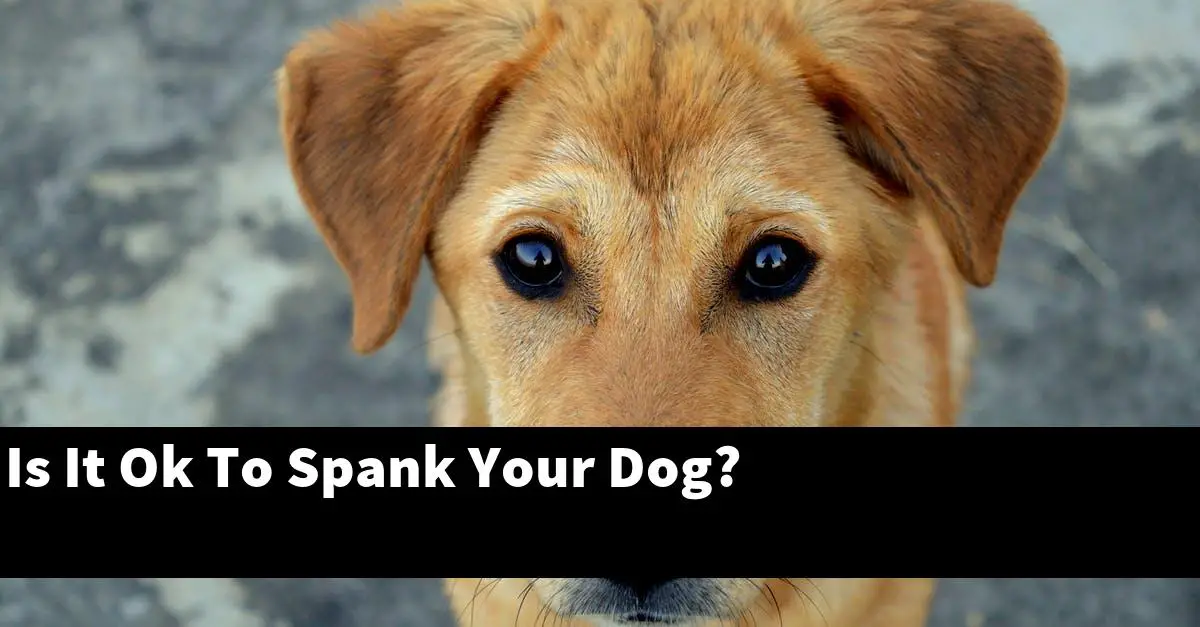Is it ever okay to spank your dog? Why or why not?
The majority of professional trainers and behaviorists do not recommend spanking dogs as a form of discipline. This is because dogs do not understand why they are being punished when they are spanked, and they may become scared or aggressive as a result.
There are much more effective and humane ways to discipline a dog, such as positive reinforcement training. With positive reinforcement, dogs are rewarded for good behavior, which helps them to understand what is expected of them.
Table of Contents
What are some alternative methods of discipline for dogs?
There are many alternative methods of discipline for dogs that can be used in place of traditional methods such as scolding, hitting, or using verbal commands. Some of these alternative methods include positive reinforcement, clicker training, and using dog-friendly pheromones.
Positive reinforcement is a method of discipline that rewards desired behaviors in order to increase the likelihood of those behaviors being repeated. For example, if a dog sits on command, they may be given a treat as a reward. This method is often used in conjunction with other methods, such as clicker training.
Clicker training is a type of positive reinforcement training that uses a small hand-held device that makes a clicking noise to mark desired behaviors. When the dog performs the desired behavior, they are immediately given a treat. This method is often used to train dogs to perform tricks or obedience commands.
Using dog-friendly pheromones is another alternative method of discipline that can be used to help calm and relax dogs. These pheromones can be found in many different products, such as sprays, collars, and diffusers. They work by releasing a calming scent that helps to reduce stress and anxiety in dogs.
Does hitting my dog discipline him?
No, hitting your dog does not discipline him. In fact, it may do the opposite. Hitting can lead to fear and aggression in dogs, and can make them more difficult to train. Dogs who are hit are more likely to bite, and may become afraid of people.
If you want to discipline your dog, there are much better ways to do it. Try positive reinforcement instead. With positive reinforcement, you rewards your dog for good behavior, instead of punishing him for bad behavior. This is much more effective, and will help you build a better relationship with your dog.
Do dogs hold grudges if you hit them?
It’s a common misconception that dogs hold grudges if you hit them. Dogs are very forgiving creatures, and they don’t harbor negative feelings the way humans do. If you hit your dog, he may be startled or scared, but he won’t hold it against you.
Do dogs remember being beaten?
There is no one definitive answer to this question. Some experts believe that dogs do remember being beaten and may be fearful of people as a result. Others believe that dogs are more likely to remember negative experiences than positive ones, but that they eventually forget the specifics of the event. Still others believe that dogs have a very short-term memory and are not capable ofremembering past events.
The truth is, we don’t really know for sure whether dogs remember being beaten. However, there is some evidence to suggest that they may. For example, studies have shown that dogs who have been abused are more likely to be fearful of people and to exhibit other signs of stress than dogs who have not been abused. Additionally, dogs who have been beaten may be more likely to cower or try to avoid contact with their abuser.
So, while we can’t say for sure whether dogs remember being beaten, it seems likely that they do. If your dog has been beaten, it is important to be aware that he may be fearful of people as a result. Be patient and gentle with him, and provide plenty of positive reinforcement to help him overcome his fear.
Do dogs hold grudges if you hurt them?
There’s no definitive answer to this question since every dog is different. Some dogs may seem to hold a grudge if they’re treated harshly or if they’re injured, while others may forgive and forget more easily. It really depends on the individual dog’s personality and temperament.
Dogs that are more prone to holding grudges may become resentful or even aggressive if they’re treated harshly. They may also be more guarded and wary around people they don’t know or trust. On the other hand, dogs that are more forgiving may be more trusting and easygoing, even after a bad experience.
Ultimately, it’s up to the owner to decide whether or not their dog is capable of holding a grudge. If you’re not sure, it’s always best to err on the side of caution and avoid doing anything that could potentially hurt or upset your dog.
Do dogs forgive when you hit them?
One common misconception about dogs is that they will automatically forgive an owner who hits them. Dogs are incredibly loyal creatures, but that does not mean they are incapable of holding a grudge. If you hit your dog, he may forgive you eventually, but he will likely never forget what you did.
Dogs have incredibly strong memories, and they are able to remember both positive and negative experiences for a long time. When you hit your dog, he will likely remember the pain and fear that he felt in that moment. He may also remember the feeling of betrayal that comes with being hurt by someone he loves and trusts.
It is possible for a dog to forgive an owner who has hit him, but it will take time and patience. You will need to work hard to rebuild your dog’s trust. Start by spending more time with him and showing him lots of love and affection. Gradually, over time, he may start to forgive you for what you did.
How long does a dog hold a grudge for?
Most dog owners have experienced their dog giving them the “cold shoulder” after they’ve done something to upset them, leading many to wonder how long dogs hold grudges.
The answer isn’t entirely clear, as it depends on the dog’s individual personality and the severity of the offense. Some dogs may forgive and forget quickly, while others may hold a grudge for days or even weeks.
If your dog is holding a grudge, there are a few things you can do to try to help them forgive and move on. First, try to identify what caused the issue and avoid that situation in the future. For example, if your dog is upset because you left them home alone, make sure to give them plenty of attention and exercise when you’re home so they don’t feel left out.
You can also try using positive reinforcement to help your dog associate you with good things. Give them treats or pet them when they’re behaving nicely towards you, and avoid punishing them when they’re still mad at you. With time and patience, most dogs will eventually come around and forgive their owners for whatever upset them.
Do dogs forgive if you hit them?
Yes, dogs can forgive if you hit them, but it depends on the severity of the hit and the dog’s personality. If the hit was minor and the dog is generally forgiving, then they will likely forgive you.
However, if the hit was severe or the dog is not forgiving, then they may not forgive you. Dogs that do not forgive usually show signs of aggression or avoidance.
Conclusion
There are a lot of different opinions out there about whether or not it is ok to spank your dog. Some people think that it is a necessary part of training, while others believe that it is a form of abuse. So, what is the truth?
The answer may surprise you, but the truth is that there is no one answer to this question. It depends on the individual dog and the situation. Some dogs will respond well to a light tap on the behind, while others may become scared or aggressive. It is important to know your dog and to understand how they will respond to this type of discipline before you decide to use it.
If you do decide to spank your dog, make sure that you do it in a way that is safe and effective. Never hit your dog in the face or use a object that could hurt them. Be sure to use only enough force to get their attention, and never more than that.
Thank you for reading this blog post. We hope that it has helped you to better understand the pros and cons of spanking your dog. As always, we encourage you to consult with a professional trainer or behaviorist if you have any concerns about your dog’s behavior.


